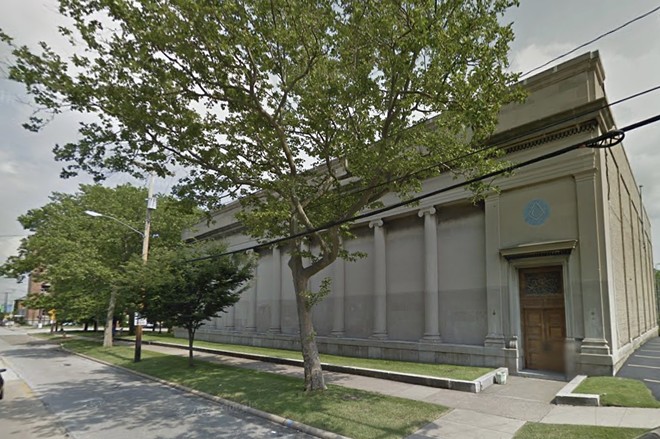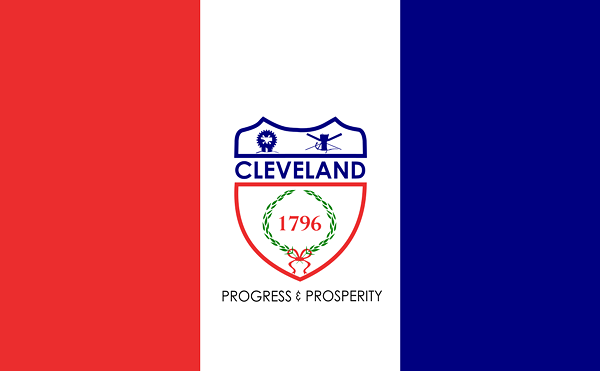Investors Sue Cleveland Rocks Climbing Gym Owner Kevin Wojton, Accuse Him of Fraud
The complaint alleges Wojton lied to investors for years
By Mark Oprea on Fri, Jan 12, 2024 at 8:25 am
[
{
"name": "Ad - NativeInline - Injected",
"component": "38482495",
"insertPoint": "3",
"requiredCountToDisplay": "5"
},{
"name": "Real 1 Player (r2) - Inline",
"component": "38482494",
"insertPoint": "2/3",
"requiredCountToDisplay": "9"
}
]
Since opening, the Cleveland Rocks climbing gym has breathed new life into the Masonic Temple building in Ohio City on Franklin Blvd.
The gym's co-founder and Masonic owner Kevin Wojton, a native who moved back to Cleveland after a stint in the finance world of New York City, positioned himself as a notable local and national success story of, among other things, the Trump-era Opportunity Zones tax incentive program, which aided in his purchase and renovation of the once-vacant property that grew to include a yoga studio with future promises of a makerspace and co-working offices.
From the inside, things weren't so rosy, according to those involved.
Ten investors who collectively poured hundreds of thousands of dollars into Cleveland Rocks in recent years this week filed a lawsuit against Wojton accusing him of fraud.
Specifically, they allege the investor deck presented at the start laid out the financial viability of the gym and the Masonic based on the existence of other rent-paying tenants that, it turns out, were operated by Wojton himself and are unable to pay rent in full; that no "distributions, preferred returns, repayments of contribution, or payments of any kind have ever been paid" to the investors; that he presented them either incomplete or falsified financial updates; and that "little, if any" of the money they gave Wojton went to ensuring the space was as profitable as it was sold. Instead, the complaint says, it was "an unlawful Ponzi scheme."
"Despite all of the representations made by Defendant Wojton regarding [the] financial condition, [his company] has defaulted in its obligations to the mortgagee of the Property," the suit alleges. (Read the full complaint below.)
As the years went by and Wojton ceased providing accurate updates, he implored the investors to avoid costly lawyers and a prolonged legal affair. They instead retained counsel, whose last interaction with Wojton came in an email exchange in November, according to the complaint, that included a deadline to produce the requested documents by the 29th of that month.
"It [sic] totally apologize," Wojton responded on the 30th. "I thought this was due on the 30th. Not the 29th. I was putting the final touches on it today and was going to be sending over asap. I have been working hard to get you all the requested documents on top of running the companies, so I appreciate your patience! I will be sending over with in [sc] the next hour!"
Wojton sent nothing the next hour nor after, the complaint notes.
Reached by phone Thursday afternoon, Wojton appeared shocked that he was the subject of a lawsuit in the first place.
"I am not aware of any lawsuit that was filed. I haven't gotten any certified mail or I wasn't informed by any lawyers or anything," he told Scene. "So this is all kind of news to me."
After being read a summarized version of the complaint, each of the ten names of the investors, and emails regarding requested accounting documents, Wojton said he in fact had previously gotten a lawyer and prepared to de-escalate the situation.
Was he upfront about the accounting?
"Yeah, absolutely," Wojton said. "There were some complications with the taxes. But we did file where we could."
As for the investors, "I gave them accounting information. I always was in communication, sharing financials, sharing market outcomes on a regular basis. I don't think there's any more communication I could've given them... I talk with them almost every week. These are people who I consider friends, people who I go to for advice, people who have been close advisors and mentors in the project. And the resulting kind of disinformation is shocking to me just because they never even approached me about any issues."
Ziad Tayeh, the lawyer for the investors suing Wojton, opted for a black-and-white stance.
"At the end of the day, there is a business relationship here, regardless of whether these people are on friendly terms," he told Scene. "When it comes to business, friendships are secondary to business. That's why we have contracts. That's why there are laws that govern these transactions."
When Cleveland Rocks soft-opened in the summer of 2021, Wojton sold it as both a climber's climbing gym—its 54-foot walls are modeled on cliffsides of Utah and Montana—and a beacon of thumbs-up development for Ohio City's growing stock of millennially-aged folk. Wojton soon brought a vinyl record player into the bouldering room. He stocked its lobby with Cleveland Rocks-branded chalk bags and T-shirts.
“Community is the most important thing to us," its website reads. "The culture at Cleveland Rocks is one founded on inclusivity, and there’s a spot for everyone and anyone who wants to be a part of this space.”
Wojton himself presented an avatar of a financially-hip tech guru in his early thirties. After working in New York investment firms, he returned home to start IOTA Labs, a venture capital firm, and The Cleveland Impact Fund, which offered expertise on and investment possibilities in Opportunity Zone projects. He's appeared in interviews with the Greater Cleveland Partnership, Politico and industry outlets on the topic. (Alternately, Salon and others covered Wojton as an example of why the Opportunity Zones program failed to deliver on its promises for the poor.)
As for the gym, according to the suit Wojton told investors there was "little to no chance of failure of the climbing gym operating business."
Plaintiffs note the court should prevent Wojton from using any of the investor funds to pay for his defense and seek his removal as manager of Cleveland Rocks.
Subscribe to Cleveland Scene newsletters.
Follow us: Apple News | Google News | NewsBreak | Reddit | Instagram | Facebook | Twitter | Or sign up for our RSS Feed
The gym's co-founder and Masonic owner Kevin Wojton, a native who moved back to Cleveland after a stint in the finance world of New York City, positioned himself as a notable local and national success story of, among other things, the Trump-era Opportunity Zones tax incentive program, which aided in his purchase and renovation of the once-vacant property that grew to include a yoga studio with future promises of a makerspace and co-working offices.
From the inside, things weren't so rosy, according to those involved.
Ten investors who collectively poured hundreds of thousands of dollars into Cleveland Rocks in recent years this week filed a lawsuit against Wojton accusing him of fraud.
Specifically, they allege the investor deck presented at the start laid out the financial viability of the gym and the Masonic based on the existence of other rent-paying tenants that, it turns out, were operated by Wojton himself and are unable to pay rent in full; that no "distributions, preferred returns, repayments of contribution, or payments of any kind have ever been paid" to the investors; that he presented them either incomplete or falsified financial updates; and that "little, if any" of the money they gave Wojton went to ensuring the space was as profitable as it was sold. Instead, the complaint says, it was "an unlawful Ponzi scheme."
"Despite all of the representations made by Defendant Wojton regarding [the] financial condition, [his company] has defaulted in its obligations to the mortgagee of the Property," the suit alleges. (Read the full complaint below.)
As the years went by and Wojton ceased providing accurate updates, he implored the investors to avoid costly lawyers and a prolonged legal affair. They instead retained counsel, whose last interaction with Wojton came in an email exchange in November, according to the complaint, that included a deadline to produce the requested documents by the 29th of that month.
"It [sic] totally apologize," Wojton responded on the 30th. "I thought this was due on the 30th. Not the 29th. I was putting the final touches on it today and was going to be sending over asap. I have been working hard to get you all the requested documents on top of running the companies, so I appreciate your patience! I will be sending over with in [sc] the next hour!"
Wojton sent nothing the next hour nor after, the complaint notes.
Reached by phone Thursday afternoon, Wojton appeared shocked that he was the subject of a lawsuit in the first place.
"I am not aware of any lawsuit that was filed. I haven't gotten any certified mail or I wasn't informed by any lawyers or anything," he told Scene. "So this is all kind of news to me."
After being read a summarized version of the complaint, each of the ten names of the investors, and emails regarding requested accounting documents, Wojton said he in fact had previously gotten a lawyer and prepared to de-escalate the situation.
Was he upfront about the accounting?
"Yeah, absolutely," Wojton said. "There were some complications with the taxes. But we did file where we could."
As for the investors, "I gave them accounting information. I always was in communication, sharing financials, sharing market outcomes on a regular basis. I don't think there's any more communication I could've given them... I talk with them almost every week. These are people who I consider friends, people who I go to for advice, people who have been close advisors and mentors in the project. And the resulting kind of disinformation is shocking to me just because they never even approached me about any issues."
Ziad Tayeh, the lawyer for the investors suing Wojton, opted for a black-and-white stance.
"At the end of the day, there is a business relationship here, regardless of whether these people are on friendly terms," he told Scene. "When it comes to business, friendships are secondary to business. That's why we have contracts. That's why there are laws that govern these transactions."
When Cleveland Rocks soft-opened in the summer of 2021, Wojton sold it as both a climber's climbing gym—its 54-foot walls are modeled on cliffsides of Utah and Montana—and a beacon of thumbs-up development for Ohio City's growing stock of millennially-aged folk. Wojton soon brought a vinyl record player into the bouldering room. He stocked its lobby with Cleveland Rocks-branded chalk bags and T-shirts.
“Community is the most important thing to us," its website reads. "The culture at Cleveland Rocks is one founded on inclusivity, and there’s a spot for everyone and anyone who wants to be a part of this space.”
Wojton himself presented an avatar of a financially-hip tech guru in his early thirties. After working in New York investment firms, he returned home to start IOTA Labs, a venture capital firm, and The Cleveland Impact Fund, which offered expertise on and investment possibilities in Opportunity Zone projects. He's appeared in interviews with the Greater Cleveland Partnership, Politico and industry outlets on the topic. (Alternately, Salon and others covered Wojton as an example of why the Opportunity Zones program failed to deliver on its promises for the poor.)
As for the gym, according to the suit Wojton told investors there was "little to no chance of failure of the climbing gym operating business."
Plaintiffs note the court should prevent Wojton from using any of the investor funds to pay for his defense and seek his removal as manager of Cleveland Rocks.
Subscribe to Cleveland Scene newsletters.
Follow us: Apple News | Google News | NewsBreak | Reddit | Instagram | Facebook | Twitter | Or sign up for our RSS Feed
Tags:
SCENE Supporters make it possible to tell the Cleveland stories you won’t find elsewhere.
Become a supporter today.
About The Author
Mark Oprea
Mark Oprea is a staff writer at Scene. For the past seven years, he's covered Cleveland as a freelance journalist, and has contributed to TIME, NPR, the Pacific Standard and the Cleveland Magazine. He's the winner of two Press Club awards.
Scroll to read more Cleveland News articles
Newsletters
Join Cleveland Scene Newsletters
Subscribe now to get the latest news delivered right to your inbox.














